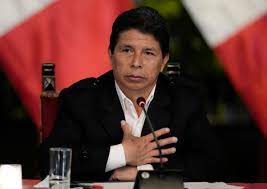LIMA, Oct 25: A court in Peru on Monday ordered the release of the sister-in-law of President Pedro Castillo almost two months after she was imprisoned while being investigated for her participation in an alleged money laundering scheme involving the president and first lady.
The decision to release Yenifer Paredes, 26, was made by the judges of the criminal appeals chamber, Peru’s judiciary said on its website. The judges ordered that after release she must stay at her home, register her fingerprints with a court each month and attend the calls from prosecutors or judges.
Paredes had been raised by Castillo and his spouse as their daughter after her mother died. It was the first time in Peru that a relative so close to a sitting president had been sent to prison.
Paredes was arrested on August 10 after surrendering to authorities, a day after the police failed in their attempt to arrest her in the presidential palace where they even searched for her under the president’s bed, according to a search report to which The Associated Press had access.
She was ordered held in prison for up to two and a half years while being investigated for criminal association and corruption.
Castillo himself faces five investigations for alleged corruption. He has denied all the accusations against him.
Prosecutors have accused Castillo, several of his relatives, former Transportation Minister Geiner Alvarado and a town mayor of being part of a criminal group that created front companies to launder money. The coordinator of the alleged group was the first lady and three relatives of the president, including Paredes, were figureheads.
The prosecution said Paredes helped the owner of one front company obtain a public works project despite not having the economic capacity or experience to guarantee its completion.
Despite being investigated, Castillo cannot be formally accused by a judge because Peru’s constitution says the president can only be accused of treason, dissolving congress without reason and for not allowing elections. Prosecutors must wait until Castillo leaves the presidency to formally present other charges against him.
Castillo was a rural teacher before he shocked Peru’s political elite by winning election as president campaigning on promises to improve education, health care and other services.
But the political neophyte’s first year has seen near constant turmoil, with cabinet members changing multiple times and Castillo staving off two impeachment attempts.
His term as president does not end until July 28, 2026. (AP)


